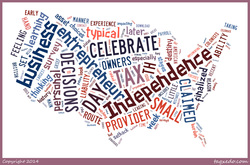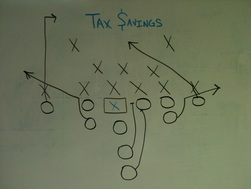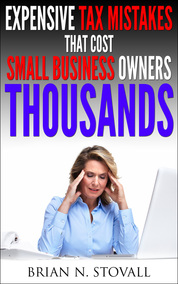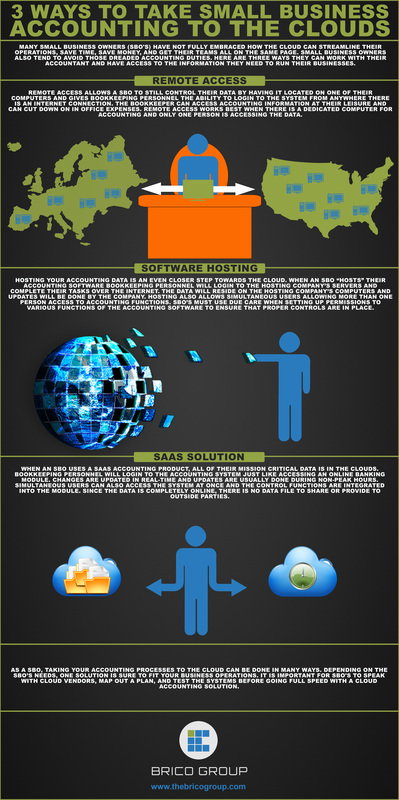 If procrastination were the Super Bowl, many small business owners (SBO's) would have multiple "Lombardi" trophies. Time to put away those whites (unless you are Billy "White Shoes" Johnson) and pull out the ole playbook of late summer early fall tax planning ideas. Just like the start of the NFL football season brings teams a new playbook, SBO's need to update their tax strategy playbooks now to ensure that they will be ready for the tax planning season starting now. Most SBO's can take a look at their previous season's record to give them an idea of how good their tax playbook was and where they need to be this year. If you have not "completed the 2013 tax season" yet, here are some of the more important "game" dates in the coming months where many SBO's can complete the 2013 tax season. • September 15th - Tax extension deadline for C-Corps, S-Corps and Partnerships • October 15th - Tax extension deadline for personal tax returns • December 31st - Final day of tax planning for 2014 season If you have completed the 2013 tax, great, but this is not the time to sit back on your laurels! Time is now to focus on new tax plays for the 2014 season. The tax league’s “Front Office” is making quite a few rule changes this year that may make it difficult for SBO’s to score many tax savings touchdowns (expiring tax provisions for SBO’s), but the basic rules are still in effect. Since the season is shorter than the NFL one, tax planning is key to saving your small business thousands. Using legal "black letter" tax strategies in your playbook will ensure you have a winning record this season. Need help devising your tax strategy playbook, feel free to contact us.
0 Comments
 As the Independence Day 4th of July celebrations are being finalized for later this week, I got to thinking about the feeling I had as an entrepreneur the day I claimed independence from the typical route and set out on my own destiny. Being an entrepreneur can provide a person with the ability to be independent but that can be both an asset and a liability. On the one hand you get to make all the decisions. Many of those decisions are made however with either little to no knowledge of the situation or the effects of those choices made (especially in the early stages of a business). Typically when decisions are made in this manner, a setback (or as some would call it a learning experience) occurs. We have learned, from taking a look back at history, the main reason we celebrate Independence Day is due to the tax burden placed on American colonists by the British. Taxes have always caused many small business owners grief. In a recent report by Paychex, a leading payroll provider; 47% of small business owners ranked taxes as the largest issue impacting them in 2014. If that includes you, then now is the time to claim your tax independence. So in between the plates of hot dogs, ribs and watching the fireworks, download the "Tax Independence Survey" below and stop making the expensive tax mistakes that keep many entrepreneurs and small businesses worried about their tax future. The survey focuses on key areas of your life (business and personal) where there may be tax savings that you can use to celebrate more holidays (maybe Christmas in July) with your family. Then after the holiday contact us so we can begin implementing some of the tax strategies. We hope you have a safe and happy Independence Day 4th of July celebration.  Operating a successful small business requires an innovative approach to your business, openness to change, and the ability to implement those changes. When a small business is in the “growth” stage, wearing the many hats can become difficult for the business owner leading the business. Most small business owners feel they need to be in every aspect of their business to ensure its continued success, however this thought process is not always the best course of action. Take accounting and bookkeeping for example. Many small business owners spend the majority of their time working in their businesses, that when it comes time to work on it (the accounting, bookkeeping stuff) they are exhausted from the work, source documents have been misplaced and other important information has been forgotten. Some business owners then chose the option of hiring a staff person to do the “grunt” work. Accounting is the foundation of any business. There is virtually no action you can do in your business without it creating an accounting transaction. From source document to financial statements and analysis, a small business owner needs the support of a capable, consistent, compliant partner. An outsourced accounting partner is the bridge to your small business success. Outsourcing your accounting provides you with the confidence that your financial records will be handled correctly from start to finish. You also will have a higher level of expertise for situations that require more than just “grunt” work, and your information can be processed faster with cloud technologies allowing you real-time access to your data. If you are a small business owner still struggling to keep up with the accounting and bookkeeping tasks in your business, then maybe it’s time to build a bridge to your success with outsourced accounting.  With the Memorial Day holiday in the rearview mirror, many small business owners and entrepreneurs and busy planning their holiday vacations and many other summer activities. Another planning activity that really needs to be on every small business and entrepreneur’s list is tax planning. If you are like most small business owners and entrepreneurs, you waste thousands of dollars every year in taxes you don’t need to pay. You then grumble about it on April 15 . . . then wait until next year to get smacked again…you see a pattern here. The sad truth is, it doesn’t matter how good your tax accountant (let’s call him “Fully Depreciated Frank”) is with a stack of receipts on April 15. The key to beating the IRS is tax planning. The summer is a great time for tax planning. As a small business owner and entrepreneur, has “Fully Depreciated Frank” contacted you with answers to all of these questions?
If not, you need to go to Amazon and get our new book “Expensive Tax Mistakes That Cost Small Business Owners Thousands”. The book reveals the mistakes and missed opportunities that can cost you thousands in tax; then shows you how proactive tax planning can rescue those wasted dollars. Stop by Amazon now and stop making those expensive tax mistakes that make you hotter than the summer heat.  No IRS Black Friday deals today? No IRS Black Friday deals today? The day to give "Thanks" is behind us and the holidays are in full swing. Millions of Americans are kicking off the season with “Black Friday” shopping. Braving the crowds and the cold, facing scorn from family they’ve left behind, they line up at obscenely early hours (or duck out of Thanksgiving dinner before the pumpkin pie is even served) to save $20 on a iPad or $40 on a flat-screen television. It’s sad, but true, that most Americans spend more time planning their “Black Friday” shopping than they spend planning their taxes. But that can be an expensive mistake! What if the IRS had a sale? What if the IRS let you discount your taxes by thousands of dollars, this year and every year to come? And what if they let you do it from the comfort of your home or your office, without lining up in the pre-dawn hours of a chilly November morning? Would you give thanks for a sale like that? You’re probably not holding your breath for the scrooges at the IRS to hold a “sale.” The good news is, you don’t have to wait for that to happen. You just need a plan. Tax planning is the key to paying the legal minimum. And a good tax plan can pay for a holiday season full of gifts and fun. Now is the season to find the mistakes and missed opportunities that may be costing you thousands. “Black Friday” tax planning before the year end can save thousands more off your taxes in the future. There are 31 days left for "Black Friday" tax planning. Contact us for ways to save on your taxes before the end of the year. Small business owners that are hearing a great deal about the cloud lately may not have all the facts when it comes to accounting in the cloud. Here is an infographic we created to outline the three major ways to take your accounting to the clouds.
In an attempt to reduce the administrative, recordkeeping, and compliance burdens of taxpayers, the IRS has offered a safe harbor method to compute the allowable deduction for the business-use portion of the home. The safe harbor method is effective for taxable years beginning on or after January 1, 2013.
Under the safe harbor method, the taxpayer multiplies the allowable square footage of the home office by the prescribed rate of $5.00. The allowable square footage for business use cannot exceed 300 square feet; thus, the maximum allowable home office deduction under the safe harbor method is $1,500. The safe harbor deduction, cannot exceed the business income for the year reduced by business expenses unrelated to the dwelling unit. Any taxpayer using the safe harbor method may not carry over any disallowed safe harbor deductions to the next year. Other Provisions
|
AuthorVarious contributors Archives
January 2024
Categories
All
|




 RSS Feed
RSS Feed